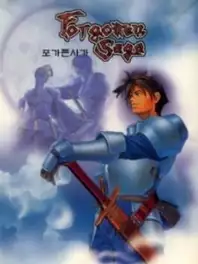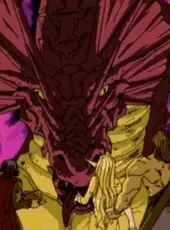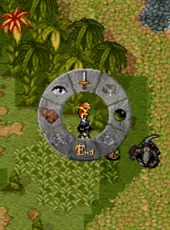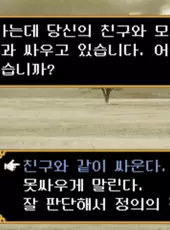
Forgotten Saga - Video
Genere:
Role-playing (RPG)
Piattaforme:
PC (Microsoft Windows), DOS
As kind of a side story, Forgotten Saga takes place in the same fictional universe as Astonishia Story, but the plots aren't interlinked and there aren't many shared characters save for Passman. While combat works similar as in Astonishia Story, there are a lot of surprising WRPG influences. In the beginning the main character's class is determined by a catalog of questions, just like in many Ultima games. Then three companions are picked from a variety of classes and typical fantasy races (Elves, Dwarves and Hobbits). Two more slots are available for more characters to join temporarily, or even replace some of the original companions for good.
The game is much more nonlineal and open ended than most Far Eastern RPGs, every town holds a variety of sidequests, which often rely on character's classes or the party's reputation, which is raised by doing good deeds. On the other hand the game punishes what the writer deemed immoral behavious, taking inspiration once again from Ultima. For a good portion of the game there isn't even a real "main story" to follow, that only unfolds after solving many individual tasks. Player decisions often have a deep impact on the outcome of a quest. At one point, for example, the party gets caught by a dragon, but manages to escape, alongside many other prisoners. If the heroes then chose to chase and kill the dragon for its treasure instead of fleeing directly, the dragon escapes, killing all fleeing prisoners on the way. The game is also full of little touches, most notable the party doesn't follow the leader in a straight line like in most JRPGs, but in a losely tied bunch of individuals.
The game is much more nonlineal and open ended than most Far Eastern RPGs, every town holds a variety of sidequests, which often rely on character's classes or the party's reputation, which is raised by doing good deeds. On the other hand the game punishes what the writer deemed immoral behavious, taking inspiration once again from Ultima. For a good portion of the game there isn't even a real "main story" to follow, that only unfolds after solving many individual tasks. Player decisions often have a deep impact on the outcome of a quest. At one point, for example, the party gets caught by a dragon, but manages to escape, alongside many other prisoners. If the heroes then chose to chase and kill the dragon for its treasure instead of fleeing directly, the dragon escapes, killing all fleeing prisoners on the way. The game is also full of little touches, most notable the party doesn't follow the leader in a straight line like in most JRPGs, but in a losely tied bunch of individuals.
Rilasciato il 01/11/1997
×
![]()




